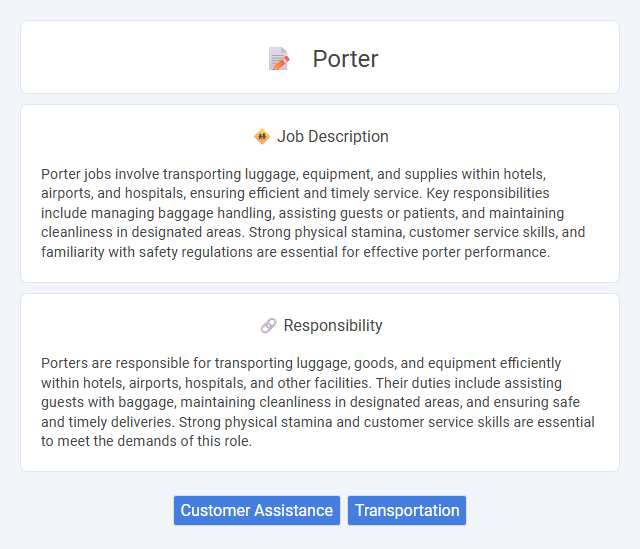
Porter jobs involve transporting luggage, equipment, and supplies within hotels, airports, and hospitals, ensuring efficient and timely service. Key responsibilities include managing baggage handling, assisting guests or patients, and maintaining cleanliness in designated areas. Strong physical stamina, customer service skills, and familiarity with safety regulations are essential for effective porter performance.
Porter jobs often require individuals who can handle physically demanding tasks, suggesting that people with good stamina and strength are probably more suitable for this role. Those comfortable with carrying heavy loads and working long hours may find the job manageable and rewarding. Individuals with limited mobility or low physical endurance might face challenges in meeting the job's demands effectively.
Qualification
Porter positions require strong physical stamina and excellent organizational skills to efficiently transport luggage and assist guests. Candidates typically need a high school diploma or equivalent, with prior experience in hospitality or customer service valued. Certifications in safety and customer interaction further enhance a porter's qualifications and job performance.
Responsibility
Porters are responsible for transporting luggage, goods, and equipment efficiently within hotels, airports, hospitals, and other facilities. Their duties include assisting guests with baggage, maintaining cleanliness in designated areas, and ensuring safe and timely deliveries. Strong physical stamina and customer service skills are essential to meet the demands of this role.
Benefit
Working as a porter probably offers valuable benefits such as physical fitness due to constant movement and lifting tasks. This role might provide opportunities for interpersonal skill development through frequent interaction with guests and staff. There is a likelihood of earning tips and sometimes additional perks like flexible hours or staff discounts in hospitality settings.
Challenge
Porter positions likely involve significant physical demands, requiring strength and endurance to transport heavy loads efficiently. Navigating busy environments and maintaining strict schedules probably present ongoing challenges that test time management skills. Adapting to varying work conditions and customer needs may also create frequent problem-solving scenarios.
Career Advancement
Porter jobs provide essential experience in the hospitality and transportation industries, serving as a foundational role for career advancement into supervisory or management positions. Gaining skills in customer service, logistics, and operations management through porter roles can lead to opportunities such as team leader, facility manager, or warehouse supervisor. Employers often promote porters who demonstrate reliability, efficiency, and strong communication, making this role a strategic starting point for long-term career growth.
Key Terms
Customer Assistance
Porters play a crucial role in customer assistance by ensuring smooth, efficient handling of guests' luggage and providing timely information about services and facilities. Their attentiveness and proactive approach significantly enhance the customer experience in hotels and transportation hubs. Skilled porters contribute to higher customer satisfaction by offering personalized support and maintaining a welcoming environment.
Transportation
Porters play a crucial role in transportation by efficiently handling luggage and cargo at airports, train stations, and bus terminals, ensuring smooth passenger flow. Their responsibilities include loading and unloading vehicles, assisting travelers with heavy bags, and maintaining the safety and organization of transport hubs. Mastery in time management and spatial awareness directly enhances operational efficiency and customer satisfaction in transportation settings.
 kuljobs.com
kuljobs.com